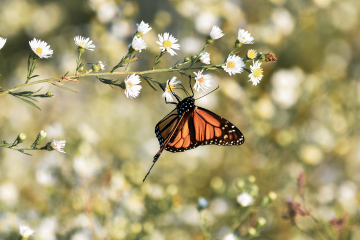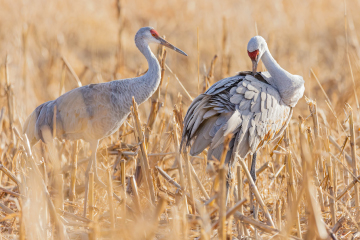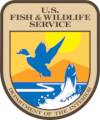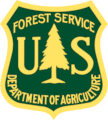The Rainwater Basin Joint Venture Informational Seminar is an annual event hosted by the partnership. This venue allows agriculture producers, researchers, and natural resource professionals an opportunity to come together to learn about the partnership, conservation opportunities, and new research findings.
The 2025 Rainwater Basin Joint Venture Informational Seminar is being held on February 6, 2025 (8:30 am to 5:00 pm) at the Ramada by Wyndham in Grand Island, NE. There will be presentations from conservation organizations across Nebraska discussing habitat management on both private and public lands, eastern red cedar removal, carbon and greenhouse gas emissions, GIS projects, and landowner attitudes towards conservation. The Seminar also includes a panel discussion on groundwater quality and nitrate management.
Additional Information
Info Seminar Presentations:
- Using Social Science Insights to Improve Conservation Outcomes
- Sandhills Stream Restoration and Native Prairie Fishes
- WRE and WREP Opportunities
- Economics of Playa Wetland Conservation Programs: A Case Study - Part 1
- Economics of Playa Wetland Conservation Programs: A Case Study - Part 2
- Communication in Conservation
- Nebraska National Forest - Halsey Restoration
- Teal View Through Time
- Ayr Lake WMA - Design and Implementation of Small Improvements
- White-front WMA | A summary of the Recent Wetland Project
- Working Together to Implement Large-scale Invasive Species Removal from a Native Landscape
- Atlanta WPA Partnership Work
- An Integrated Hydrologic Model for the Northern High Plains Aquifer
- Assessing Wet Meadow Habitat in the Central Platte River Valley
- Guidance and Resources for Playa Wetland Restoration in Nebraska
- Species Distribution Models to Increase the Impacts of Cedar Management in the Sandhills
- Overview of the Sandhills Taskforce
2024 Informational Seminar Registration
The 2024 Rainwater Basin Joint Venture Informational Seminar is being held on March 14, 2024 (8:30 am to 5:00 pm) at the Ramada by Wyndham in Grand Island, NE. Seminar topics include 3 panel discussions on private lands projects, public lands projects, and nitrate management and groundwater quality. There will be presentations from conservation organizations across Nebraska discussing habitat management on both private and public lands, eastern red cedar removal, carbon and greenhouse gas emissions, GIS projects, and landowner attitudes towards conservation. Additional event info will be added to this page as it finalized.
2024 Info Seminar Presentations
EZ Acres Private Lands Project
Geographic Information Systems Data
Habitat Selection By Waterfowl
Happolds Private Lands Project
Landowner Attitudes Towards Restoration
24th Annual RWBJV Info Seminar was Held on February 7, 2019
Landowners, agricultural producers, conservation professionals, congressional staff, researchers, and students gathered for a day of education and networking about conservation in Nebraska. The 24th annual Rainwater Basin Joint Venture Informational Seminar was held on Thursday, February 7, 2019 at the Ramada Midtown Grand Island (the former Hotel Grand Conference Center) in Grand Island, Nebraska. The Seminar ran from 9:30 a.m. to 4 p.m. with the exhibit hall open and check-in available starting at 8:30 a.m. The schedule is here.
The presentations were designed to be highly informative and useful. Participants learned about conservation funding opportunities, programs that combine wildlife and habitat conservation with agricultural and livestock production, successful wetland management techniques, methods for grazing cattle while enhancing wetlands, and much more.
The seminar was free for landowners and operators. For all others, a $40 fee covered registration, lunch, coffee/tea/snacks, and a conference. Mark Vrtiska, Waterfowl Program Manager for Nebraska Game and Parks Commission, delivered a plenary address on integrating social information (i.e., human dimensions) into Joint Venture goals and planning. This was followed by concurrent sessions on three tracks – providing something for everyone! And, the annual RWBJV Habitat Stewardship Awards were announced during lunch with Little Blue NRD receiving the 2019 Conservation Partner of the Year Award, Shanda Spurgeon the recipient of the 2019 Conservation Professional of the Year Award, and Dale Seidel awarded the 2019 Landowner Stewardship Award.
To view pdfs of the presentations, click below. To hear about what the conference participants valued about the conference, click here.
- 2018 Farm Bill Update
- Atlanta Waterfowl Production Area
- Beef Cattle Grazing Management in Rainwater Basin Wetlands
- Conservation Projects in the Sandhills of Nebraska
- Integrating Social Information into Joint Venture Goals and Planning
- Land Trades - A Win-win for Producers and Wetland Conservation
- Migratory Bird SAFE
- Nebraska's Berggren Plan - Habitat Accomplishments
- PRRIP Land Success & PRRA
- Rainwater Basin Soils - Development, Morphology & Sedimentation Tactics
- Temporalspatial Shifts in Sandhill Crane Staging
- The Nebraska Natural Legacy Project
- The New and Improved Closed Upland Depression ESD, PART 1
- The New and Improved Closed Upland Depression ESD, PART 2
- The Open Fields and Waters Program
- USFWS RWB WMD Habitat Management Plan
- Working Lands for Wildlife - A Leveraged Approach
- Agrichemicals in the RWB - Presence, timing and the potential of toxicity to amphibians - Hellman
- Divots in the Pivots RCPP - Eigenberg
- Early Rainwater Basin Technical Studies - Gilbert & Stutheit
- Forage Production in RWB Wetlands - Hillhouse & Anderson
- Grazing Plans for Wetlands - Nadine Bishop
- Grazing, Spraying, Pumping and Fire - Krohn, Lesiak & Souerdyke
- Impact of VRI Technology on Net Farm Income - Schoengold & Jones
- Migratory Bird, Butterfly and Pollinator SAFE - Reisdorff
- Navigating trade-offs when managing for multi-species avian communities - Stuber
- Nebraska Wetland Condition Assessment - Dreier
- Pit-Fill Decision Model - Walker & Garrett
- RWBJV Water Plan - Varner & Stutheit
- The Conservation Process - A Landowner's Perspective - Fitzke & Nugent
- The economy of public access hunting - TJ Fontaine
- Using UAS for Playa Wetland Monitoring and Assessment - Tang & Hu
- Working Wetlands - Feeding Cows and Waterfowl in Nebraska's RWB - Shaw
- Learning About People to Better Manage Wildlife - Dr. Chizinski - 2
















